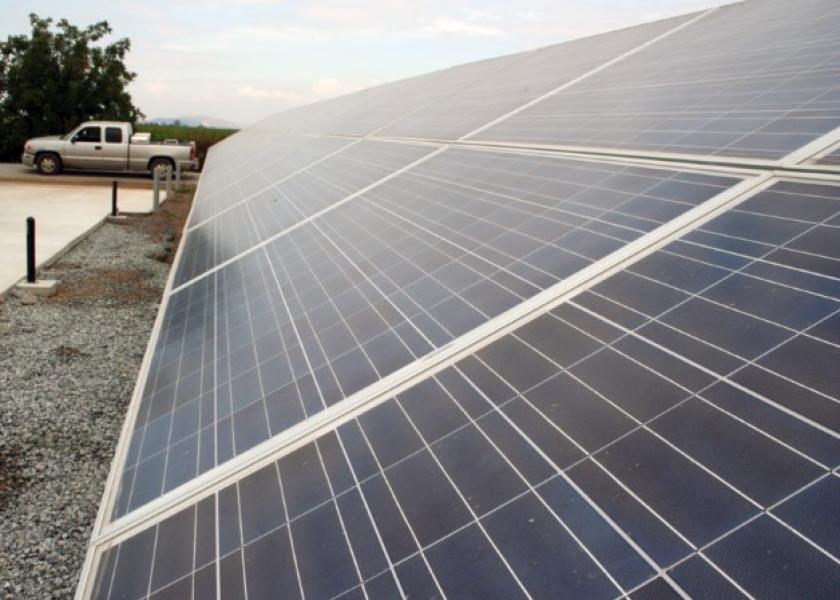Is Solar Energy an Option for Your Farm?

Have you ever wondered if your farm would be a candidate for solar energy? If you’ve got a sturdy roof or an open space nearby, then it’s likely it is.
According to the U.S. Energy Information Administration, renewable energy is defined as energy derived from sources that are naturally replenishing. Solar energy falls into the renewable energy category, and its growth has skyrocketed over the last few decades due to lower installation costs and consumer demand for more sustainable energy.
During the Professional Dairy Producers of Wisconsin 2021 Business Conference, Adam Wehling, Dean of Agriculture, Energy and Transportation at Chippewa Valley Technical College, spoke on how to easily incorporate a solar energy system onto your ag operation. According to Wehling, these systems can be easily integrated into your existing facilities, can improve the efficiency of the systems you currently have and can reduce your overall energy cost.
Factors to Consider
“Solar is the king of renewable energy right now,” Wehling says. “The efficiency of these systems has gone up and there’s a lot more production and technology than there was years ago. If your goal is to be viewed as a more environmentally friendly farm, putting renewable energy systems on can be very visually appealing to your community.”
However, before you go installing one of these systems on your operation, there are a few things to consider:
Metering – “The first thing you want to do is to check with your metering company to see what type of net metering you have,” Wehling says.
According to Wehling, net metering is essentially an “energy bank.” If you produce more energy than you can use in a month, the energy will go to the “bank” which can then be stored for a period of time. This allows you to bank kilowatts during high-producing months and utilize those kilowatts during low-production months. Ideally, producers should try to obtain a 6-month to 12-month net metering contract with their energy company.
Grid Tied or Battery Operation
Unless you want to be “off the grid,” there’s really no reason to become a battery operation, Wehling says. It’s just not as cost-effective.
Instead, he recommends going with a grid tied system. This system allows excess energy to flow into the grid, allows you to pull from the grid when needed and ensures you are still able to access energy if for some reason the solar system goes down.
Sizing the System
When it comes to sizing your solar system, Wehling recommends working with your energy company to understand how big your energy system needs to be.
“As an agricultural producer, you may have the opportunity to go larger than residential systems,” Wehling says. “However, you’ll still want to check what your cap will be for energy.”
Before you make any decisions, it’s important to do your homework before committing to a size, Wehling warns.
“Just know that you’ll want to size your system no bigger than your annual energy usage,” he says. “Pull out your previous energy bills, add up all the kilowatts you’re using and then when you’re talking to a solar contractor, let them know what that number is.”
Additionally, if you have the three-year running average of your kilowatt usage, be sure to share that information with your contractor. This can aid in making decisions on if it will be necessary to expand in the future.
Location
“When you’re determining where you want to locate your panels, the roof is a great location if the roof is designed to carry the extra load,” Wehling says. “You’ll want to check with your engineer or whoever designed your structure to see what the weight load rating is on your roof.”
Another thing to consider is the amount of shade your solar system will receive. If you have shade trees or taller structures nearby, this may impede your solar production. Dusty environments also impact solar efficiency, Wehling warns.
If the roof is not an option, you may be able to use a ground-mount system. However, if you decide to utilize a ground-mount system, it’s likely the structure will be there for a long period of time. So, it’s important to take into consideration what your facility design will look like in the future and if this structure will be in the way. Additionally, you don’t want to place ground-mounted systems too far away because you will have to trench lines to your meter, which can become costly.
Cost and Payback
According to Wehling, most solar systems are designed to last 20 to 30 years and will pay for themselves within 10 to 15 years depending on the system. One thing to keep in mind, however, is the amount of incentives and tax rebates offered along with these systems. These programs, accompanied with grants, depreciation and rebates, will help bring the cost of the system down.







